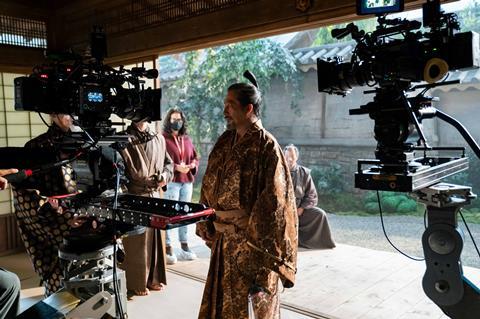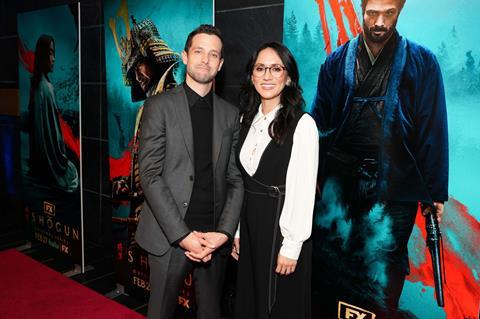
In the era of short attention spans, fast-paced content delivery and TV executives impatiently hunting for the next streaming hit, the long gestation of FX on Hulu/Disney+’s Shōgun feels at odds with most shows.
FX optioned James Clavell’s bestselling 1975 novel, on which the series is based, well over a decade ago, and it has taken six years since its commission in 2018 to make it to screens. FX initially partnered with the UK’s DNA Films on the revival, and tapped Gunpowder creator Ronan Bennett to write and produce. Bennett would eventually leave the project, with Top Gun: Maverick screenwriter Justin Marks and Rachel Kondo taking over.
Set in feudal Japan in the year 1600, Shōgun centres on Lord Yoshii Toranaga (Hiroyuki Sanada), who is fighting for his life as enemies on the Council of Regents unite against him. When a European ship is found marooned in a nearby fishing village, its English pilot John Blackthorne (Cosmo Jarvis) comes bearing secrets that could help Toranaga tip the scales of power and devastate the formidable influence of Blackthorne’s own enemies — the Jesuit priests and Portuguese merchants. The fates of Toranaga and Blackthorne become inextricably tied to their translator Toda Mariko (Anna Sawai, star of Pachinko and Monarch: Legacy Of Monsters), who battles the conflicting emotions of serving her lord, her growing feelings for Blackthorne and her commitment to faith and duty.
Shōgun’s unshowy, methodical entrance into the premium-scripted landscape has not hindered its cut-through. The debut episode was the most-viewed scripted general entertainment series across Disney+ (which released it internationally) and Hulu (which released in the US), raking in 9 million views worldwide.
“I think audiences respond to the very simple idea that the most basic human impulse is to create meaning out of your life,” says Kondo, Shōgun’s co-creator, writer and executive producer. “Be it through love, revenge, whatever it is. This is the basic human impulse. And that’s all we wrote to.”
“This idea transcends culture. We know the inherent aspect to this story and production — the clash of cultures and East meets West,” adds Marks, also co-creator, writer and executive producer. “But all of us, Japanese, American, Canadian, English, what we shared on this was a desire to tell a story about agency. And what we wanted to convey to the audience is, because that idea is psychological, it transcends culture. It’s something that we can all relate to.”
Major decisions

Husband-and-wife creative duo Marks and Kondo do not underplay how big a task it was to bring the show to screen. One of the most striking aspects is that although it is an ‘English-language’ show, it is majority shot in Japanese with English representing a fraction of the dialogue. By the later episodes, proud aristocratic Englishman Blackthorne is speaking more in the local tongue (the show was filmed in Canada).
It felt a major decision for arguably FX’s biggest drama swing ever. “There were decisions made with a lot of conversation, both in terms of how we would write it, but also to have the dialogue with that accent and whether we were all good with this,” says Marks.
“It wasn’t like we were told, ‘Sure, go for it and try.’ We had to come to it responsibly and understand what we were doing.”
Marks, a veteran of feature films whose credits include Disney’s live-action The Jungle Book, notes these were not necessarily masterstroke decisions, knowing that audiences in 2024 are more comfortable watching shows with subtitles.
“We know it could have just fallen flat on its face when it came to reaching an audience,” he says. “There’s no way to predict that, it’s just a game of luck. The thing I say will always end up in failure is doing something that people have seen before.
“You can’t predict what will succeed, but you can guarantee that if you’re just trying to deliver what was delivered last year, that will fail,” Marks continues. “Audiences want to be surprised, and if you can surprise people and get a little lucky, then success can happen.”
Kondo, for whom this was her first TV writing project, highlights the impact of FX Networks chairman John Landgraf and his team for helping mould the series. “They included people [in the process] who maybe, at first glance, you wouldn’t include in something so big,” she says. “Justin has screen experience but he was relatively new to TV. I was new to everything, and they took a chance on us. They’re just so committed to the process.
“It’s been eye-opening every step of the way for a new person like me. At every turn, my mind was expanding and then getting exploded and expanding.”
Shōgun feels different to much of what is on TV currently. Though it has some startling action scenes, much of the 10 episodes are focused on the action — or inaction — building up to the Battle of Sekigahara. Pointedly, this conflict never takes place on screen and much of the drama is elicited from the conversations between protagonists, the political and cultural mores and the threat of conflict.
Kondo suggests that not having preconceptions about what a streaming TV series for 2024 should be like helped create a show of authenticity. “Inexperience and naiveté lends itself to, let’s say, unintentional focus on the right things,” she says. “We were just trying to tell a good story and trying to figure out the pacing that would keep viewers energised and interested. Blessed ignorance, right?”
Marks picks up the point. “We seem to have lost our way a bit over the last 15 years when it comes to what kind of stories audiences want,” he says. “It’s not that I feel under-serviced looking for grown-up dramas, and I love the most commercial movies and television [that dominate] as well. But, fundamentally, just give us a good story.”
There are “great shows out there that are doing this but which are getting drowned out in the noise of expensive”, he adds.
While acknowledging that Shōgun is in that budget bracket, Marks cites Clavell’s source work as a page-turner in “the classic, traditional way”, with characters that resonate.
“You love these characters, you hate these characters, you want to see them fall in love. You want to see them fall out of love. You want to see them live, when they’re going to die. [That’s different to] the [shows in the] arms race we’re in.
“Fortunately, I think we’re out of that now,” continues Marks. “Just by necessity, the economy has pushed us into a different realm. And I’m very excited and optimistic for what television can be in that landscape, because it can get back to the things that we like. Just give me a good hang every night with characters I love.”
Kondo hypothesises that historical dramas lend themselves to that “good hang”.
“We know, typically, how these stories end,” she says. “Maybe we were not as familiar with Shōgun, because it’s feudal Japan, but you know from history how this turns out. So the emphasis is not the beginning, not the end, but the middle. And that middle portion of storytelling is incredibly difficult to get right.”
As well as picking the toughest part of the story to focus on, the show’s creators gave themselves the additional challenge of sustaining audiences’ interest over 10 episodes. The season’s length is in the upper reaches of a TV miniseries, as Shōgun is billed. Its recent FX/Hulu peers such as The Veil, Fleishman Is In Trouble and The Full Monty have been six, eight and eight episodes respectively. Kondo, a short-story writer by background, says she focused on creating “10 short stories” and figuring out how to make them “feel engaging and satisfying on their own, but add up in a way that leaves you both surprised and feeling like the story [as a whole] could have only ended up that way”.
“Rachel’s point about the 10 short stories is true, because at no point do I believe we were ever trying to make a 10-hour feature,” Marks concurs. “I think it’s a total fallacy in television when I hear that. We were trying to tell 10 good stories that are all connected to each other and the discipline beneath that is to say, TV at its best is about one thing at a time, with many sides.”
Given the success of the show, it was recently announced that Sanada had signed on to reprise his role as Lord Toranaga in a potential Shōgun sequel, despite the series covering the entirety of Clavell’s book. The characters’ journeys and narratives remain intriguingly open at the end of the 10 episodes, and Marks and Kondo have toyed with the idea of more.
“We love these characters, and we love this world,” says Marks. “If we could find a story that felt like [it could be] better than what we did before, we would be open to that.”
The nominations-round voting period for the 76th Primetime Emmy Awards is open from June 13-24.







![The Brightest SunScreen[Courtesy HKIFF]](https://d1nslcd7m2225b.cloudfront.net/Pictures/274x183/3/5/0/1448350_thebrightestsunscreencourtesyhkiff_312678.jpg)

















No comments yet